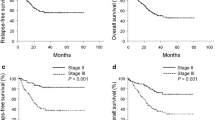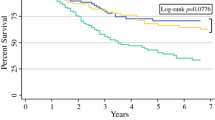Abstract
Background
The benefit of adjuvant therapy following resection of early stage, node-negative gastric adenocarcinoma following a margin negative (R0) resection is unclear.
Methods
The National Cancer Data Base was used to identify patients with a T2N0 gastric adenocarcinoma (tumor invasion into the muscularis propria) who underwent R0 resection. Patients treated with neoadjuvant therapy and those for whom lymph node count was unavailable were excluded from the analysis. Kaplan–Meier and Cox regression were used to evaluate differences in and predictors of overall survival.
Results
A total of 1687 patients underwent R0 resection for T2N0 gastric adenocarcinoma between 2003–2011. Adjuvant chemotherapy treatment was administered to 7.1 and 14.1 % received adjuvant chemoradiation; 65.4 % had <15 lymph nodes examined. Multivariate Cox regression identified higher Charlson score, <15 lymph nodes examined, higher tumor grade, and tumor location in the cardia as factors associated with significantly decreased overall survival. With a median follow-up of 36 months, the 5-year overall survival was 71 % for patients with ≥15 lymph nodes examined and 53 % for those with <15 lymph nodes (p < 0.001). In patients who had <15 lymph nodes examined, there was an overall survival benefit for adjuvant chemoradiation (hazard ratio 0.71, p = 0.043). In patients with ≥15 lymph nodes examined, no survival benefit for adjuvant therapy was identified (p > 0.74).
Conclusions
Adequate lymph node dissection and pathologic staging is critical in directing optimal treatment of patients with early gastric cancer. Understaging as a result of suboptimal lymphadenectomy may explain the perceived benefit of adjuvant chemoradiation after an R0 resection for T2N0 gastric cancer.


Similar content being viewed by others
References
Macdonald JS, Smalley SR, Benedetti J, et al. Chemoradiotherapy after surgery compared with surgery alone for adenocarcinoma of the stomach or gastroesophageal junction. N Engl J Med. 2001;345(10):725–30.
Cunningham D, Allum WH, Stenning SP, et al. Perioperative chemotherapy versus surgery alone for resectable gastroesophageal cancer. N Engl J Med. 2006;355(1):11–20.
Coburn NG, Govindarajan A, Law CH, et al. Stage-specific effect of adjuvant therapy following gastric cancer resection: a population-based analysis of 4,041 patients. Ann Surg Oncol. 2008;15(2):500–7.
Seyedin S, Wang PC, Zhang Q, Lee P. Benefit of adjuvant chemotherapy for gastric adenocarcinoma: a SEER analysis. Gastrointest Cancer Res. 2014;7(3–4):82–90.
Jin LX, Moses LE, Squires MH 3rd et al. Factors associated with recurrence and survival in lymph node-negative gastric adenocarcinoma: a 7-institution study of the US Gastric Cancer Collaborative. Ann Surg. 2015. doi:10.1097/SLA.0000000000001084.
Du C, Zhou Y, Huang K, Zhao G, Fu H, Shi Y. Defining a high-risk subgroup of pathological T2N0 gastric cancer by prognostic risk stratification for adjuvant therapy. J Gastrointest Surg. 2011;15(12):2153–8.
Brar SS, Mahar AL, Helyer LK, et al. Processes of care in the multidisciplinary treatment of gastric cancer: results of a RAND/UCLA expert panel. JAMA Surg. 2014;149(1):18–25.
National Comprehensive Cancer Network. NCCN Clinical Practice Guidelines in Oncology: Gastric Cancer. 2015. http://www.nccn.org/professionals/physician_gls/PDF/gastric.pdf.
Gold JS, Al Natour RH, Saund MS, et al. Population-based outcome of stage IA-IIA resected gastric adenocarcinoma: who should get adjuvant treatment? Ann Surg Oncol. 2013;20(7):2304–10.
Baiocchi GL, Tiberio GA, Minicozzi AM, et al. A multicentric Western analysis of prognostic factors in advanced, node-negative gastric cancer patients. Ann Surg. 2010;252(1):70–3.
Smith DD, Schwarz RR, Schwarz RE. Impact of total lymph node count on staging and survival after gastrectomy for gastric cancer: data from a large US-population database. J Clin Oncol. 2005;23(28):7114–24.
Hartgrink HH, van de Velve CJ, Putter H, et al. Extended lymph node dissection for gastric cancer: who may benefit? Final results of the randomized Dutch gastric cancer group trial. J Clin Oncol. 2004; 22:2069.
Bilimoria KY, Stewart AK, Winchester DP, Ko CY. The National Cancer Data Base: a powerful initiative to improve cancer care in the United States. Ann Surg Oncol. 2008;15:683–900.
Commission on Cancer. Facility Oncology Registry Data Standards (FORDS). Chicago, IL: American College of Surgeons; 2012.
Deyo, RA, Cherkin DC, Ciol MA. Adapting a clinical comorbidity index for use with ICD-9-CM administrative databases. J Clin Epidemiol. 1992;45:613–9.
Fritz, A, Percy, C, Jack, A, Shanmugaratnam, K, Sobin, L, Parkin, DM, Whelan, S, editors. International Classification of Diseases for Oncology. 3rd edn. Geneva: World Health Organization; 2000.
American Joint Committee on Cancer. AJCC Cancer Staging Manual. 7th edn. Chicago: Springer; 2010.
Bang YJ, Kim YW, Yang HK, et al. Adjuvant capecitabine and oxaliplatin for gastric cancer after D2 gastrectomy (CLASSIC): a phase 3 open-label, randomised controlled trial. Lancet. 2012;379(9813):315–21.
Liu TS, Wang Y, Chen SY, Sun YH. An updated meta-analysis of adjuvant chemotherapy after curative resection for gastric cancer. Eur J Surg Oncol. 2008;34(11):1208–16.
Diaz-Nieto R, Orti-Rodriguez R, Winslet M. Post-surgical chemotherapy versus surgery alone for resectable gastric cancer. Cochrane Database Syst Rev. 2013;9:CD008415.
Smalley SR, Benedetti JK, Haller DG, et al. Updated analysis of SWOG-directed Intergroup study 0116: a phase III trial of adjuvant radiochemotherapy versus observation after curative gastric cancer resection. J Clin Oncol. 2012;30(19):2327–33.
Lee J, Lim do H, Kim S, et al. Phase III trial comparing capecitabine plus cisplatin versus capecitabine plus cisplatin with concurrent capecitabine radiotherapy in completely resected gastric cancer with D2 lymph node dissection: the ARTIST trial. J Clin Oncol. 2012;30(3):268–73.
Dai Q, Jiang L, Lin RJ, Wei KK, Gan LL, Deng CH, Guan QL. Adjuvant chemoradiotherapy versus chemotherapy for gastric cancer: a meta-analysis of randomized controlled trials. J Surg Oncol. 2015;111(3):277–84.
Snyder RA, Castaldo ET, Bailey CE, Phillips SE, Chakravarthy AB, Merchant NB. Survival benefit of adjuvant radiation therapy for gastric cancer following gastrectomy and extended lymphadenectomy. Int J Surg Oncol. 2012; doi:10.1155/2012/307670.
Baxter NN, Tuttle TM. Inadequacy of lymph node staging in gastric cancer patients: a population-based study. Ann Surg Oncol. 2005;12(12):981–7.
Bilimoria KY, Talamonti MS, Wayne JD, et al. Effect of hospital type and volume on lymph node evaluation for gastric and pancreatic cancer. Arch Surg. 2008;143(7):671–8.
Author information
Authors and Affiliations
Corresponding author
Additional information
Haejin In and Olga Kantor have contributed equally to this work.
Rights and permissions
About this article
Cite this article
In, H., Kantor, O., Sharpe, S.M. et al. Adjuvant Therapy Improves Survival for T2N0 Gastric Cancer Patients with Sub-optimal Lymphadenectomy. Ann Surg Oncol 23, 1956–1962 (2016). https://doi.org/10.1245/s10434-015-5075-1
Received:
Published:
Issue Date:
DOI: https://doi.org/10.1245/s10434-015-5075-1




